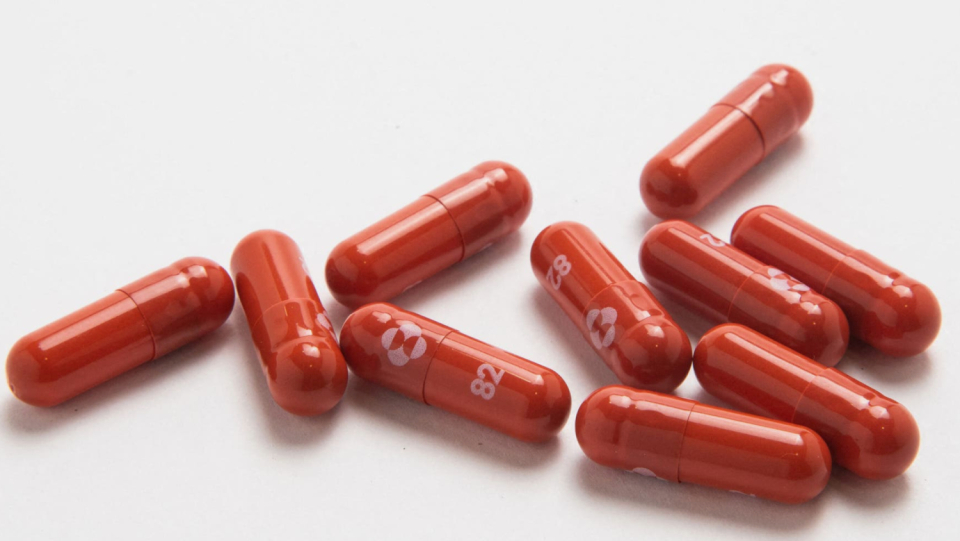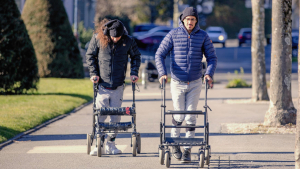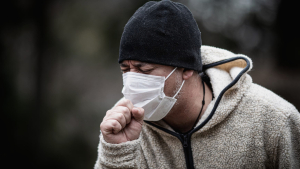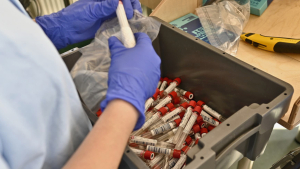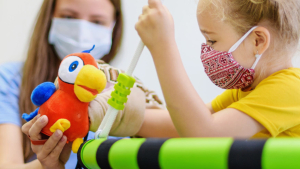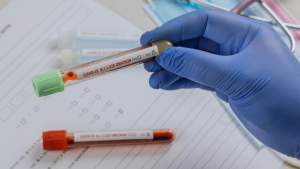Molnupiravir is one of two antiviral drugs that have caused excitement in recent months. Preliminary results of clinical studies have shown that they can significantly reduce the number of hospital stays and deaths in connection with COVID-19. The emergency approval on the part of the US Food and Drug Administration (FDA) is still pending. An advisory committee of the FDA came together on November 30th and narrowly joined 13 to 10 votes to recommend this approval.
The agency's lengthy deliberations may point to uncertainties regarding the efficacy and safety of the antiviral: The full study data submitted to the FDA suggest that molnupiravir is less effective than originally thought. This dampens scientists' hopes that the relatively cheap and easy-to-use treatment could change the course of the pandemic.
The results published before the meeting of the advisory committee showed: The drug, which was developed by the pharmaceutical company Merck, based in Kenilworth, New Jersey, and the biotechnology company RIDBACK Biotherapeutics in Miami, Florida, reduces the risk of hospital inscription Reason for Covid-19 by 30 percent-compared to a 50 percent reduction that was observed at the beginning of the study. "It's not particularly good," says Katherine Seley-Radtke, a medical chemist who develops antiviral medication at the University of Maryland. "It's pretty lackluster." Eliav Barr, Senior Vice President of Global Medical and Scientific Affairs at Merck, is of the opinion that a reduction in hospital stays would still be an advantage, especially in areas in which the number of infections increases significantly.
Monoclonal antibody therapy, on the other hand, reduces the risk of severe Covid-19 illness by up to 85 percent. However, the funds are costly and must be administered intravenously. The search for an effective oral antiviral is therefore a high priority for scientists who want to better treat high-risk patients in rural areas and underserved countries, says Seley-Radtke.
Reduced expectations
The first study group from Merck comprised 762 people who received four tablets of Molnupiravir or a placebo twice a day between May and early August 2021. A second group consisted of 646 people who gave the same treatment between August and early October. All subjects, almost 80 percent of whom lived in Europe or Latin America, began treatment within five days after the Covid 19 symptoms appeared. The scientists determined exactly how many of them came to the hospital or died due to Covid 19 complications. In the first group, the rate of hospital admissions or deaths fell by half if the participants had taken Molnupiravir instead of a placebo. In the second group, however, there was almost no difference between those who had received the antiviral means and those who had received the placebo.
Nicholas Kartsonis, Senior Vice President of Clinical Research at Merck, told the FDA's advisory committee on November 30 that the company could not explain the very different results-which were not checked by specialist colleagues in the Peer Review. Some members of the committee pointed out that the highly transferable delta variant of the SARS-COV-2-Coronavirus in the first half of the study was not yet predominant worldwide, while this was the case in the second half. This could mean that Molnupiravir against Delta is not as effective as against some other variants.
According to Sankar Swaminathan, division chief of infectious diseases at the University of Utah Health in Salt Lake City, it's also possible that differences in demographics or study group locations had an impact on which participants were hospitalized or the quality of their care. Swaminathan is a member of the FDA Advisory Committee that reviewed molnupiravir.
The 13-to-10 decision of the body to recommend emergency approval is far from the overwhelming consent, which was expected after the announcement of the provisional study results. The members of the committee struggled to decide whether the advantages of the medication predominate the largely unknown risks.
Molnupiravir risks being balanced
Merck has reported a similar number of side effects to the subjects who had taken the virostatics as with those who received a placebo. Nevertheless, some researchers are concerned that Molnupiravir's new mechanism of action harbors the potential for long -term security risks. The antiviral agent works by fitting into the RNA of the virus, creating errors there and hindering the ability of Sars-Cov-2 for replication.
The deliberate introduction of mutations into viral RNA could produce a more dangerous version of Sars-CoV-2, critics say. In such a scenario, changes could occur in the virus's spike protein, which it uses to enter human cells, potentially making the virus more transmissible or evading vaccines. This is especially a problem, according to Swaminathan, who voted against the approval of molnupiravir, when people do not complete the full five-day treatment with 40 tablets. In this case, some of the mutated virus could survive in the body and then be transmitted to others.
However, some researchers argue that the likelihood that a perfectly mutated version of SARS-COV-2 will survive the virostatic and is even reinforced is rather low. But it is not impossible. Kartsonis pointed out that Merck was no longer able to prove remaining viruses to the study participants after the five -day treatment. However, the company did not test the medication in people with a weakened immune system, for whom it could be difficult to completely remove the virus from its body with the help of the antivirus.
In addition to the risks to the general public, the FDA Advisory Committee also discussed potential risks to individuals. Studies on cells indicate a risk that molnupiravir causes mutations in human DNA, especially in rapidly reproducing cells such as blood cells or sperm. However, tests on animals have shown that this risk is low. Still, many committee members recommended the agency should either put up warnings on molnupiravir or prevent children under 18 and pregnant people from receiving the drug until more data on its safety is available.
"From an ethical point of view, I do not think it is appropriate to give this medication during pregnancy," said Janet Cragan, doctor at the US Centers for Disease Control and Prevention in Atlanta, who participated in the meeting of the advisory committee. But she also adds: "I am not sure whether you can say to a pregnant woman who is ill with Covid-19 and wants the medication that she cannot get it."
The hope remains
Since the number of confirmed deaths by the Coronavirus is more than five million people worldwide, civil servants of public health hope that antiviral funds such as Molnupiravir can quickly be used anywhere-especially in view of the rapidly spreading omicron variant.
Scientists are still trying to understand how omicron affects the effectiveness of the vaccine and the treatment of Covid-19. Nevertheless, the variant would have caused the advisory committee during its meeting a big headache, according to Swaminathan. According to the FDA committee member, molnupiravir should theoretically be effective independently of the Sars-CoV-2 version due to how it works. But the study data on its effectiveness against Delta suggest that this is not true. An antiviral that works against all versions of Sars-CoV-2 would be a boon — especially if current monoclonal antibody treatments don't work against omicron or a future variant. In such a situation, "we would be severely limited in our ability to prevent hospitalization," he says.
The United States is not the first country to consider the approval of the virostatic. On November 4, the United Kingdom was the first country to grant Molnupiravir, and in mid -November the Beximco Pharmaceuticals from Bangladesh, based in Dhaka, began selling a generic version of the medication.
Given doubts about the efficacy and potential risks of molnupiravir, health authorities are eager to find alternatives. In early November, New York City-based Pfizer released initial results showing that the antiviral Covid-19 drug Paxlovid reduced the number of hospitalizations and deaths by 89 percent. The mechanism of action of Paxlovid differs from that of molnupiravir.
Seley-Radtke hopes that despite the deterioration of the data on molnupiravir, research on the medication and Paxlovid could still lead to effective medication cocktails that combine antiviral means to combat SARS-COV-2. "A multi-stage attack not only stops the growth of the virus, but also slowing down resistance," said Seley-Radtke. It is more difficult for a virus to develop a resistance to a combination of several drugs than against a single. "Ultimately, a cocktail will be the better solution," she says.







